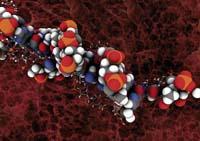The RNA can question the laws of Mendel

140 years ago, the Austrian Gregor Mendel discovered the basic rules of genetic inheritance. Subsequently, biochemists realized that the chemistry of genes is the cause of these norms. However, in the last decade, several cases have been identified that do not comply with these rules. Therefore, biochemicals have had to reconsider chemistry in these cases and have found that the RNA molecule can also participate in genetic inheritance.
The research was carried out with a gene that controls the color of the animal. Each mouse has two copies of the gene, one of his father and one of his mother, and if he has both mutated copies, the mouse dies immediately after birth. But if the mutation is in a single gene, the mouse will survive, yes, the mutation will leave a trace: the legs and tail will be white.
This case complies with the laws of Mendel. But biochemicals have found that there are mice with white legs and tails that have no mutations in the genes. These cases are contrary to the laws of Mendel. Some French biochemists have found that in this case the RNA molecule is also inherited, that is, that parents add something more than genes. For biochemists, this RNA is transmitted in the sperm of their father, but this idea remains unconfirmed. However, as a result of this transmission, children can develop genetic diseases without being transmitted any mutated genus of their parents.





